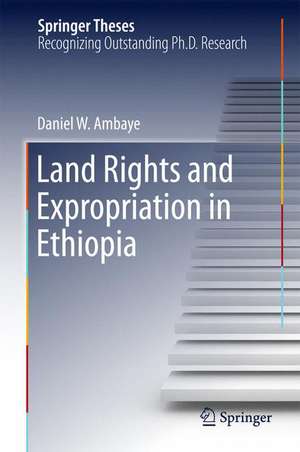Land Rights and Expropriation in Ethiopia: Springer Theses
Autor Daniel W. Ambayeen Limba Engleză Hardback – 18 mar 2015
Expropriation is an inherent power of the state to acquire land for public purpose activities. It is an important development tool in a country such as Ethiopia where expropriation remains the only method to acquire land. Furthermore, the two preconditions of payment of fair compensation and existence of public purpose justifications are not strictly followed in Ethiopia. The state remains the sole beneficiary of the process by capturing the full profit of land value, while paying inadequate compensation to those who cede their land by expropriation. Secondly, the broader public purpose power of the state in expropriating the land for unlimited activities puts the property owners under imminent risk of expropriation.
| Toate formatele și edițiile | Preț | Express |
|---|---|---|
| Paperback (1) | 640.55 lei 6-8 săpt. | |
| Springer International Publishing – 6 oct 2016 | 640.55 lei 6-8 săpt. | |
| Hardback (1) | 646.75 lei 6-8 săpt. | |
| Springer International Publishing – 18 mar 2015 | 646.75 lei 6-8 săpt. |
Din seria Springer Theses
- 18%
 Preț: 997.88 lei
Preț: 997.88 lei -
 Preț: 389.88 lei
Preț: 389.88 lei - 15%
 Preț: 646.94 lei
Preț: 646.94 lei - 18%
 Preț: 943.43 lei
Preț: 943.43 lei -
 Preț: 399.29 lei
Preț: 399.29 lei - 18%
 Preț: 944.99 lei
Preț: 944.99 lei - 15%
 Preț: 636.80 lei
Preț: 636.80 lei - 18%
 Preț: 941.05 lei
Preț: 941.05 lei - 15%
 Preț: 643.16 lei
Preț: 643.16 lei - 15%
 Preț: 642.68 lei
Preț: 642.68 lei - 18%
 Preț: 1103.62 lei
Preț: 1103.62 lei - 20%
 Preț: 558.82 lei
Preț: 558.82 lei - 18%
 Preț: 1112.30 lei
Preț: 1112.30 lei - 18%
 Preț: 944.19 lei
Preț: 944.19 lei - 18%
 Preț: 1109.92 lei
Preț: 1109.92 lei - 18%
 Preț: 1217.27 lei
Preț: 1217.27 lei - 15%
 Preț: 640.06 lei
Preț: 640.06 lei - 15%
 Preț: 636.45 lei
Preț: 636.45 lei - 15%
 Preț: 640.06 lei
Preț: 640.06 lei - 15%
 Preț: 640.88 lei
Preț: 640.88 lei -
 Preț: 389.70 lei
Preț: 389.70 lei - 20%
 Preț: 563.89 lei
Preț: 563.89 lei -
 Preț: 393.35 lei
Preț: 393.35 lei - 15%
 Preț: 637.93 lei
Preț: 637.93 lei - 15%
 Preț: 641.85 lei
Preț: 641.85 lei - 18%
 Preț: 1225.94 lei
Preț: 1225.94 lei - 20%
 Preț: 551.36 lei
Preț: 551.36 lei - 18%
 Preț: 1229.10 lei
Preț: 1229.10 lei - 15%
 Preț: 639.25 lei
Preț: 639.25 lei - 18%
 Preț: 999.45 lei
Preț: 999.45 lei - 15%
 Preț: 640.06 lei
Preț: 640.06 lei - 18%
 Preț: 1220.45 lei
Preț: 1220.45 lei - 18%
 Preț: 1116.26 lei
Preț: 1116.26 lei - 18%
 Preț: 1110.72 lei
Preț: 1110.72 lei - 18%
 Preț: 1000.87 lei
Preț: 1000.87 lei - 18%
 Preț: 891.17 lei
Preț: 891.17 lei - 15%
 Preț: 640.06 lei
Preț: 640.06 lei - 5%
 Preț: 1154.07 lei
Preț: 1154.07 lei - 15%
 Preț: 635.96 lei
Preț: 635.96 lei - 15%
 Preț: 640.88 lei
Preț: 640.88 lei -
 Preț: 387.20 lei
Preț: 387.20 lei - 18%
 Preț: 1109.92 lei
Preț: 1109.92 lei -
 Preț: 385.25 lei
Preț: 385.25 lei -
 Preț: 385.25 lei
Preț: 385.25 lei - 18%
 Preț: 1112.30 lei
Preț: 1112.30 lei - 18%
 Preț: 999.45 lei
Preț: 999.45 lei -
 Preț: 386.99 lei
Preț: 386.99 lei - 15%
 Preț: 637.13 lei
Preț: 637.13 lei - 20%
 Preț: 554.20 lei
Preț: 554.20 lei - 20%
 Preț: 555.57 lei
Preț: 555.57 lei
Preț: 646.75 lei
Preț vechi: 760.88 lei
-15% Nou
Puncte Express: 970
Preț estimativ în valută:
123.75€ • 129.56$ • 102.40£
123.75€ • 129.56$ • 102.40£
Carte tipărită la comandă
Livrare economică 05-19 aprilie
Preluare comenzi: 021 569.72.76
Specificații
ISBN-13: 9783319146386
ISBN-10: 3319146386
Pagini: 282
Ilustrații: XV, 282 p. 3 illus. in color.
Dimensiuni: 155 x 235 x 22 mm
Greutate: 0.59 kg
Ediția:2015
Editura: Springer International Publishing
Colecția Springer
Seria Springer Theses
Locul publicării:Cham, Switzerland
ISBN-10: 3319146386
Pagini: 282
Ilustrații: XV, 282 p. 3 illus. in color.
Dimensiuni: 155 x 235 x 22 mm
Greutate: 0.59 kg
Ediția:2015
Editura: Springer International Publishing
Colecția Springer
Seria Springer Theses
Locul publicării:Cham, Switzerland
Public țintă
ResearchCuprins
Research Background and Methodology.- Land Rights in Ethiopia.- Conceptualizing Expropriation.- Expropriation Procedure.- Public Purpose.- Valuation and Compensation During Expropriation.- Conclusions and Recommendations.- Annex.
Notă biografică
Dr. Ambaye has been teaching and researching in the Institute of land Administration and the Law School of Bahir Dar University for several years. He wrote many conference papers and journal articles focusing on land issues in Ethiopia. In 2013, he published a textbook, Ethiopian Land Law, that is widely used by post and undergraduate students and practitioners.
Textul de pe ultima copertă
This thesis provides a new approach to the Ethiopian Land Law debate. The basic argument made in this thesis is that even if the Ethiopian Constitution provides and guarantees common ownership of land (together with the state) to the people, this right has not been fully realized whether in terms of land accessibility, enjoyability, and payment of fair compensation in the event of expropriation.
Expropriation is an inherent power of the state to acquire land for public purpose activities. It is an important development tool in a country such as Ethiopia where expropriation remains the only method to acquire land. Furthermore, the two preconditions of payment of fair compensation and existence of public purpose justifications are not strictly followed in Ethiopia. The state remains the sole beneficiary of the process by capturing the full profit of land value, while paying inadequate compensation to those who cede their land by expropriation. Secondly, the broader public purpose power of the state in expropriating the land for unlimited activities puts the property owners under imminent risk of expropriation.
Expropriation is an inherent power of the state to acquire land for public purpose activities. It is an important development tool in a country such as Ethiopia where expropriation remains the only method to acquire land. Furthermore, the two preconditions of payment of fair compensation and existence of public purpose justifications are not strictly followed in Ethiopia. The state remains the sole beneficiary of the process by capturing the full profit of land value, while paying inadequate compensation to those who cede their land by expropriation. Secondly, the broader public purpose power of the state in expropriating the land for unlimited activities puts the property owners under imminent risk of expropriation.
Caracteristici
Nominated as an outstanding Ph.D. thesis by Royal Institute of Technology (KTH), Stockholm, Sweden Provides a new approach to the Ethiopian Land Law debate Includes a special chapter on the current land right of Ethiopia Outlines clear procedural steps in handling the expropriation process Offers innovative and pragmatic proposed solutions Includes supplementary material: sn.pub/extras
















